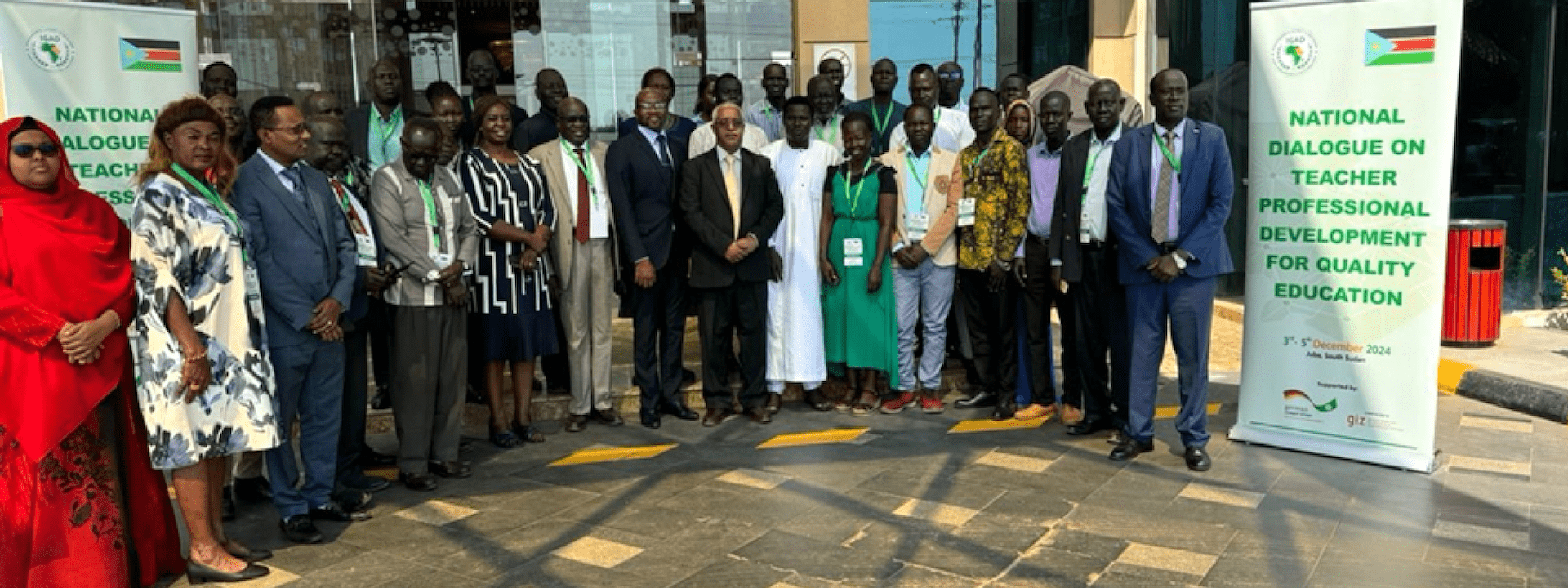December 7, 2024 (Juba, South Sudan): The Intergovernmental Authority on Development (IGAD) has organised the South Sudanese National Dialogue on Teacher Professional Development for Quality Education in Juba, South Sudan.
The dialogue aimed to:
- Foster a common understanding of the importance of continuous professional teacher development at all levels within the country.
- Agree on the modalities of the regional Teacher Training Programme.
- Mobilise the support of national partners and stakeholders for teacher training initiatives.
Speaking on behalf of Madam Fathia Alwan, Director of the Health and Social Development Division at IGAD, Dr. Victoria Anib, Head of the Social Development Unit, urged the Government of South Sudan to prioritise the welfare of teachers. She emphasised the need for increased funding for education, improved resources for teacher training institutes, timely payment of teachers’ salaries, and the provision of psychosocial support.
“I would like to commend the Government of the Republic of South Sudan for initiating the development of the National Qualification Framework, which aligns with the IGAD Regional Qualification Framework. Additionally, I appreciate the government’s efforts in creating a costed plan of action to implement the Djibouti Declaration,” she noted.
Dr. Anib also highlighted that the inclusion of refugees in the National Education System demonstrates South Sudan’s commitment to the principles outlined in the Djibouti Declaration. She stressed the importance of peace education in South Sudan and other conflict-affected countries in the IGAD region.
She further stated that South Sudan has recently launched the Durable Solutions Strategy and Plan of Action to guide the creation of conditions conducive to the voluntary, safe, and dignified return, reintegration, and resettlement of displaced persons and their host communities.
In his remarks, Mr. Ramsey Flomo Bryant, UNHCR Senior Protection Officer, noted that the event coincided with the recent launch of South Sudan’s Durable Solutions Strategy and Plan of Action for Refugees, Internally Displaced Persons, Returnees, and Host Communities.
Mr. Bryant acknowledged the importance of this National Dialogue in addressing the integration needs of returnee and refugee teachers, including those in urban refugee programmes, to build their resilience. He reaffirmed UNHCR’s commitment to facilitating actions for gender-responsive Continuous Professional Development (CPD) for teachers, including certification programmes for refugee, asylum-seeking, and host community teachers.
“We recognise the Ministry of General Education and Instruction’s challenge in addressing the training needs of the 42% of refugee and host teachers across the education spectrum who remain largely unqualified, as well as the gender disparity disproportionately affecting female teachers,” he added.
On his part, Mr. Omst Okonyolok, Director General of the National Curriculum Development Centre at the Ministry of General Education and Instruction, highlighted that Continuous Professional Development is essential for preparing teachers for lifelong learning.
He emphasised that enhancing teacher training programmes and teaching methods promotes inclusive education.
Dr. Kebede Kassa Tsegaye, Senior Coordinator for Education, Science, Technology, and Innovation at IGAD, recalled that since the adoption of the Djibouti Declaration in December 2017, IGAD has made significant progress. Key initiatives include the IGAD Teacher Training Initiative, the IGAD Council of Higher Education, the IGAD Regional Scholarship Programme, the IGAD Regional Qualifications Framework, and the IGAD Monitoring and Evaluation Framework.
The National Dialogue was attended by representatives of South Sudan’s Ministry of General Education and Instruction, other relevant government sectors, UNHCR, and the IGAD Secretariat.
The workshop, funded by GIZ, resulted in a shared understanding among stakeholders, enhanced collaboration, and an agreement on the way forward.
During the discussions, it was revealed that since the outbreak of conflict in Sudan, over 851,825 individuals have crossed into South Sudan as of 31 October 2024. Among these, 76% are South Sudanese returnees, 23% are Sudanese refugees, and 1% are Eritreans, Ethiopians, and third-country nationals.
Currently, South Sudan hosts approximately 502,000 refugees and asylum seekers across more than 25 locations in the country. Over 60% of this population are children and young people of school-going age (3–17 years).

